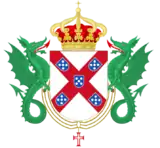List of monarchs of Brazil
The monarchs of Brazil (Portuguese: monarcas do Brasil) were the imperial heads of state and hereditary rulers of Brazil from the House of Braganza that reigned from the creation of the Brazilian monarchy in 1815 as a constituent kingdom of the United Kingdom of Portugal, Brazil and the Algarves until the republican coup d'état that overthrew the Empire of Brazil in 1889.[1]
| Monarchy of Brazil | |
|---|---|
Imperial | |
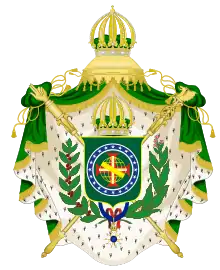 | |
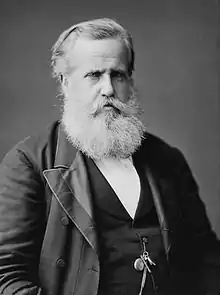 | |
| Details | |
| Style | His/Her Most Faithful Majesty His/Her Imperial Majesty |
| First monarch | Maria I (as Queen) |
| Last monarch | Pedro II (as Emperor) |
| Formation | 16 December 1815 |
| Abolition | 15 November 1889 |
| Pretender(s) | Disputed: Prince Pedro Carlos (Petrópolis Branch) Prince Luís (Vassouras Branch) |
Since the transfer of the Portuguese Court to Brazil in 1808 the colonial rule had de facto ended. On 16 December 1815 the Prince Regent John, the future king John VI raised Brazil to the status of a kingdom, thus making his mother, Maria I, the reigning Queen, the first Monarch of Brazil. The next year, 20 March 1816, John succeeded his mother as King of the united Luso-Brazilian monarchy. Having proclaimed independence of the Kingdom of Brazil from Portugal in 1822, Pedro I, son of John VI, was acclaimed the first Emperor of Brazil on 12 October 1822. He was later succeeded on 7 April 1831 by his son Pedro II, deposed along with the 74-years-old monarchy on 15 November 1889 in a bloodless and unpopular military coup d'état.
Title
From 16 December 1815 to 7 September 1822, while the Kingdom of Brazil was in union with the Kingdom of Portugal, the monarch's full title and styles were, according to tradition and the United Kingdom's 1822 Constitution: By the Grace of God, King/Queen of the United Kingdom of Portugal, Brazil, and the Algarves, of either side of the sea in Africa, Lord of Guinea and of Conquest, Navigation and Commerce of Ethiopia, Arabia, Persia and India, etc.[2]
From 12 October 1822 to 15 November 1889, as the independent Empire of Brazil, the country's monarch's full title were: By Grace of God and Unanimous Acclamation of the People, Constitutional Emperor/Empress and Perpetual Defender of Brazil.
It's worth noting that from a short period of time, between 15 November 1825 and 10 March 1826, according to the Treaty of Rio de Janeiro, by which Portugal recognized Brazilian independence, it was granted to King John VI the courtesy title of Emperor of Brazil, while his son was the actual reigning Emperor. From the treaty's date to his death John VI used the title: By the Grace of God, John VI, Emperor of Brazil, King of Portugal and the Algarves, of either side of the sea in Africa, Lord of Guinea and of Conquest, Navigation and Commerce of Ethiopia, Arabia, Persia and India, etc.[2]
United Kingdom of Portugal, Brazil and the Algarves (1815–1822)
Empire of Brazil (1822–1889)
House of Braganza (1822–1889)
| Portrait | Name | Monarch from | Monarch until | Relationship with predecessor(s) |
|---|---|---|---|---|
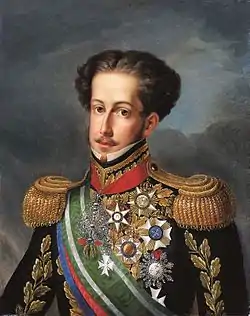 | Pedro I | 12 October 1822 | 7 April 1831 | • Grandson of Maria I of Portugal • Son of John VI of Portugal |
 | Pedro II | 7 April 1831 | 15 November 1889 | • Great-grandson of Maria I of Portugal • Grandson of John VI of Portugal • Son of Pedro I of Brazil |
See also
- History of Brazil
- History of Portugal
- List of governors-general of Brazil (including the viceroys)
- List of Brazilian consorts
- List of Presidents of Brazil
- List of Portuguese monarchs
References
- Bandeira, Moniz. Casa da Torre de Garcia d'Avila. Editora Record, 2000, pp. 423–425
- Amaral, Manuel. "João VI". In: Portugal – Dicionário Histórico, Corográfico, Heráldico, Biográfico, Bibliográfico, Numismático e Artístico, Volume III, 2000–2010, pp. 1051–1055. In Portuguese.

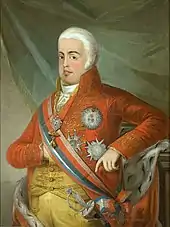
.svg.png.webp)
